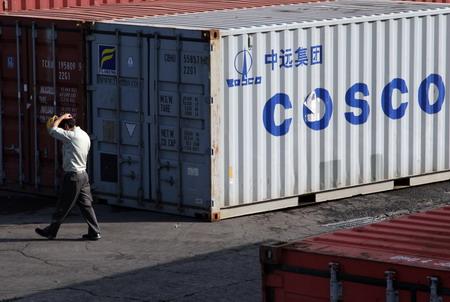
A worker passes a China Ocean Shipping Group Co (COSCO) container at a terminal in Yokohama, Japan. COSCO is on the list of 50 State-owned enterprises that the State-owned Assets Supervision and Administration Commission has decided to develop into top-ranking worldwide companies during the next five years. [Photo / Bloomberg]
Thirty firms will become Fortune 500 companies by the end of 2010BEIJING - China will develop 50 central government-invested State-owned enterprises (SOEs) into top-ranking global companies over the next five years.
The move came as regulators called for the upgrading of innovative capacities to strengthen the international competitiveness of the SOEs.
"The key target of the SOEs' development during the 12th Five-Year Plan (2011-2015) period is to improve their international competitiveness and influence," said Wang Yong, chairman of the State-owned Assets Supervision and Administration Commission of the State Council (SASAC).
Wang said SASAC will support up to 50 SOEs in their efforts to become leading global companies within the next five years, as 35 SOEs pledged to develop into global industrial giants possessing advanced technology in line with international standards.
In the first 11 months of this year, the total profit generated by SOEs hit a record 802 billion yuan ($120 billion), with year-on-year growth of 50.1 percent.
China now has 122 central SOEs nationwide. Net profits have doubled in the last five years, and 30 SOEs will become Fortune 500 companies by the end of this year, compared with 10 in 2005.
Wang said those SOEs that can be regarded as multinational companies should be high-tech with their own intellectual property rights. They should aim to grow by means of improving their innovative capacities, management efficiency and technological skills.
To beef up their innovative ability, SOEs will increase expenditure on research and development (R&D) from 2 to 3.5 percent of each company's total assets next year.
"Compared with some international companies who spend 10 percent of their total assets on R&D, our devotion to R&D is still not big enough," Wang said, adding that rewards for scientific researchers should also be encouraged.
As a part of the effort to reinforce the strength of SOEs, SASAC has accelerated their integration, in a bid to optimize the allocation of State-owned assets.
China Reform Holdings Corporation Ltd, the State-owned capital-operating company backed by SASAC, was founded on Wednesday as an engine for SOE integration.
According to Orient Securities, the integration may concentrate on companies in high-technology fields, including the electrical, mechanical and chemical industries.
China Reform Holdings will also provide supplementary capital support in some strategic and emerging industries to strengthen key fields considered vital to the country's economic development, SASAC said.
Apart from technological innovation, SASAC will also strengthen its supervision of the overseas business of SOEs next year, in an attempt to sustain their development.
"Profit generated by business conducted abroad accounts for one-third of the total profits of SOEs, so it's crucial to manage these assets effectively," Wang said.
According to SASAC, 108 SOEs had invested in foreign companies with State-owned assets of more than 4 trillion yuan by the end of 2009.
In June, China Ocean Shipping Group Co (COSCO), the nation's largest shipping and logistics enterprise, signed a 4.3 billion euro ($3.28 billion) deal to assume management of Piraeus, the largest container port in Greece, for 35 years.
Piraeus is one of the most important ports in the Eastern Mediterranean region. COSCO will spend another 620 million euros to upgrade its facilities, construct a new pier, and triple the cargo volume capacity from the current annual capacity of 1.8 million containers a year.
Wang of SASAC said that aiming to promote international operational ability means China must increase the global market share of SOEs, and deepen international cooperation in economics and technology.





